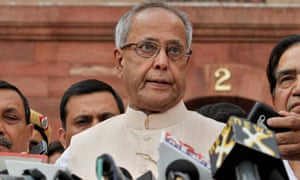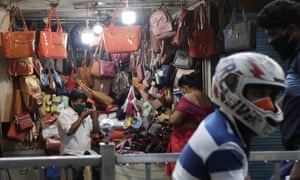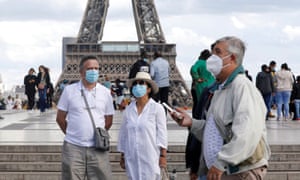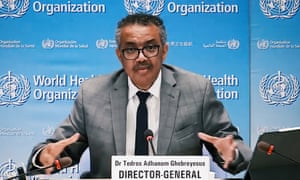Coronavirus live news: WHO says states can’t ‘pretend pandemic is over’, French cases rise 50% in August
NewsColony
Coronavirus live news: WHO says states can’t ‘pretend pandemic is over’, French cases rise 50% in August
Back to India and the former Indian president, Pranab Mukherjee, a senior leader of the Congress party who served in multiple cabinets during five decades in politics, has died. He was 84.
Mukherjee had emergency surgery for a blood clot in his brain on 10 August after a fall. The hospital said he tested positive for Covid-19 after the surgery and his condition was critical.

Pranab Mukherjee speaks in the run-up to India’s presidential election in 2012. He was awarded India’s highest civilian honour, the Bharat Ratna, in 2019. Photograph: Adnan Abidi/Reuters
He remained in a coma after the operation. The hospital said his health began declining on Monday after a lung infection resulted in septic shock.
The government has announced a week of mourning. Prime minister Narendra Modi, who leads the rival Bharatiya Janata party, tweeted that Mukherjee “left an indelible mark on the development trajectory” of India. “His wise counsel on key policy matters will never be forgotten by me,” he said.
You can read our full story below:
Australia’s southern state of Victoria has recorded 70 new cases and five new deaths. The state has been in a strict stage four lockdown, which has seen new infections fall and I believe 70 is the lowest case number in nearly two months. The premier, Daniel Andrews, said he the roadmap out of the lockdown would be outlined on the weekend.
Victoria has been the centre of cases in the past two months, but concerns are held for a growing cluster linked to Sydney’s central business district, and on Tuesday the north-eastern state of Queensland reported two new cases. The state’s southern border with New South Wales will remain closed through September.
You can stay up to date on all of the developments on our Australian live blog.
VicGovDHHS
(@VicGovDHHS)#COVID19VicData for 1 September, 2020:
There were 70 new cases and sadly 5 deaths reported in Victoria yesterday. Our thoughts are with the loved ones of all those affected.
We’ll have more information for you later today in our media release. pic.twitter.com/by6mfDDWxx
India’s economy growth suffered a historic 23.9% contraction in the April-June quarter, as the strict coronavirus lockdown hit businesses.
It was the biggest fall since the country started publishing quarterly statistics 1996. On Monday the government warned the figures could be revised further since the pandemic had also affected the ability to collect accurate data on economic activity.
“The entire quarter was spent in lockdown and it was a complete washout for the Indian economy,” Mumbai-based economist Ashutosh Datar told Agence France-Presse.
India’s sudden shutdown from late March prompted a huge exodus by millions of migrant workers who fled cities for their villages due to a lack of food and money. Many factories struggled to cope with labour shortages, even after lockdowns lifted.
Construction activity was halved, while manufacturing plummeted by nearly 40% compared to the previous year.
India has the fastest growing rate of coronavirus infections, with 3.62m infections and 64,469 deaths. It ranks as the third worst affected country on both counts, behind the US and Brazil.

A shop sells handbags in Mumbai, India. Photograph: Rajanish Kakade/AP
France’s new Covid-19 infections surged by almost 50% in August, hitting 281,025 cases, versus 187,919 at the end of July.
New cases in August increased on average by a record 3,003 every day, a figure four times higher than July’s average increase of 746 per day.
The seven-day moving average of new infections, which smoothes out reporting irregularities, stood at 5,167, reaching a new record for a fourth day in a row, versus a low of 272 on 27 May, two weeks after the country ended its two-month long lockdown.
The surge of new cases has led authorities to re-impose some containment measures, such as making face masks mandatory in the streets, shops and public transportation of almost all the country’s main cities.
And, as of Tuesday, masks will also be compulsory in workplaces.
But, as the new school year starts this week, French president Emmanuel Macron and prime minister Jean Castex have been saying they will do everything to avoid a new national lockdown.

People wearing protective masks stand at the Trocadero square near the Eiffel Tower. Photograph: Charles Platiau/Reuters
The World Health Organization has urged governments to engage with people demonstrating against Covid-19 restrictions and listen to their concerns, but stressed protesters needed to understand the virus was dangerous.
Tedros Adhanom Ghebreyesus voiced understanding for the growing frustration felt as people continue to have to deal with restrictions eight months into the pandemic.
“We understand that people are tired and yearn to get on with their lives. We understand that countries want to get their societies and economies going again,” he said.
The UN health agency, he stressed, “fully supports efforts to re-open economies and societies… but we want to see it done safely.” But he also insisted that “no country can just pretend the pandemic is over”.
“If countries are serious about opening up, they must be serious about suppressing transmission and saving lives,” he said, insisting that “opening up without having control is a recipe for disaster”.
Tedros took issue with the opinions voiced by some that high death rates were not really a concern if it is mainly the elderly who are dying.
“Accepting someone to die because of age is moral bankruptcy at its highest, and we shouldn’t allow our society to behave this way,” he said.
“Every life whether it is young or old is precious. And we have to do everything to save it.”

The WHO’s Tedros Adhanom Ghebreyesus said: ‘Every life whether it is young or old is precious. And we have to do everything to save it.’ Photograph: Xinhua/REX/Shutterstock
Asked about recent demonstrations in a number of countries against coronavirus restrictions, WHO Director-General Tedros Adhanom Ghebreyesus said it was important to “listen to what people are asking, what people are saying”.
“We should engage in an honest dialogue,” he told reporters, stressing though that demonstrators have a responsibility to ensure protests are safe.
“The virus is real. It is dangerous. It moves fast and it kills,” he said, insisting “we have to do everything to protect ourselves and to protect others”.
Speaking about the broader protests, the WHO emergencies chief Michael Ryan pointed out that “epidemics and emergencies create strong emotions, and acceptance of measures is always very, very tough.
“It is really important that governments don’t overreact to people protesting against measures,” he told the virtual briefing.
“The real important thing to do is to enter into a dialogue with groups.”
Hello and welcome to the Guardian’s continuing live coverage of the coronavirus pandemic, with me, Alison Rourke.
The World Health Organization’s boss, Tedros Adhanom Ghebreyesus, says “no country can just pretend the pandemic is over”, warning that “opening up without having control is a recipe for disaster”.
But Tedros urged states to understand the the growing frustration people felt over the pandemic: “We understand that people are tired and yearn to get on with their lives. We understand that countries want to get their societies and economies going again,” he said.
His emergencies director, Michael Ryan, called on governments not to “overreact to people protesting against measures,” saying that “epidemics and emergencies create strong emotions, and acceptance of measures is always very, very tough”.
In other developments:
- France’s new Covid-19 infections shot up by 50% in August. France saw its highest monthly tally since the beginning of the outbreak earlier this year, while hospitalisations for the disease seem to be creeping up again.
- Spain infections rise more than 23,000 since Friday. Health ministry data showed 2,489 new cases were diagnosed in the past 24 hours, bringing the total since the onset of the pandemic to 462,858.
- The United States passed 6m coronavirus infections, according to the Johns Hopkins University tracker. The milestone comes amid rising infection in some Midwestern states, including Iowa, North Dakota, South Dakota and Minnesota.
- Hong Kong will start conducting mass coronavirus tests on Tuesday. The voluntary tests are part of an attempt to stamp out a third wave of infections that began in late June and saw the densely populated city reimpose economically painful social distancing measures.
- India’s former president Pranab Mukherjee died after testing positive. He was 84. Mukherjee had emergency surgery for a blood clot in his brain on 10 August at New Delhi’s army hospital research and referral after suffering a fall. The hospital said he had tested positive for coronavirus after the surgery and his condition was critical. The news came as the country’s economy shrank nearly 24% in the last quarter.
- The United Arab Emirates recorded more than 500 daily Covid-19 infections, the highest number over a 24-hour period in nearly two months. The Gulf Arab state has reported 541 infections and two deaths, the highest since 683 cases were recorded on 5 July.
Source: The Guardian |NewsColony
The post Coronavirus live news: WHO says states can’t ‘pretend pandemic is over’, French cases rise 50% in August appeared first on NewsColony.
NewsColony
source https://newscolony.com/coronavirus-live-news-who-says-states-cant-pretend-pandemic-is-over-french-cases-rise-50-in-august/
- Get link
- X
- Other Apps
- Get link
- X
- Other Apps
Comments
Post a Comment